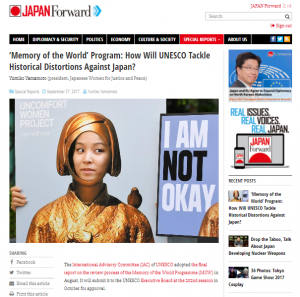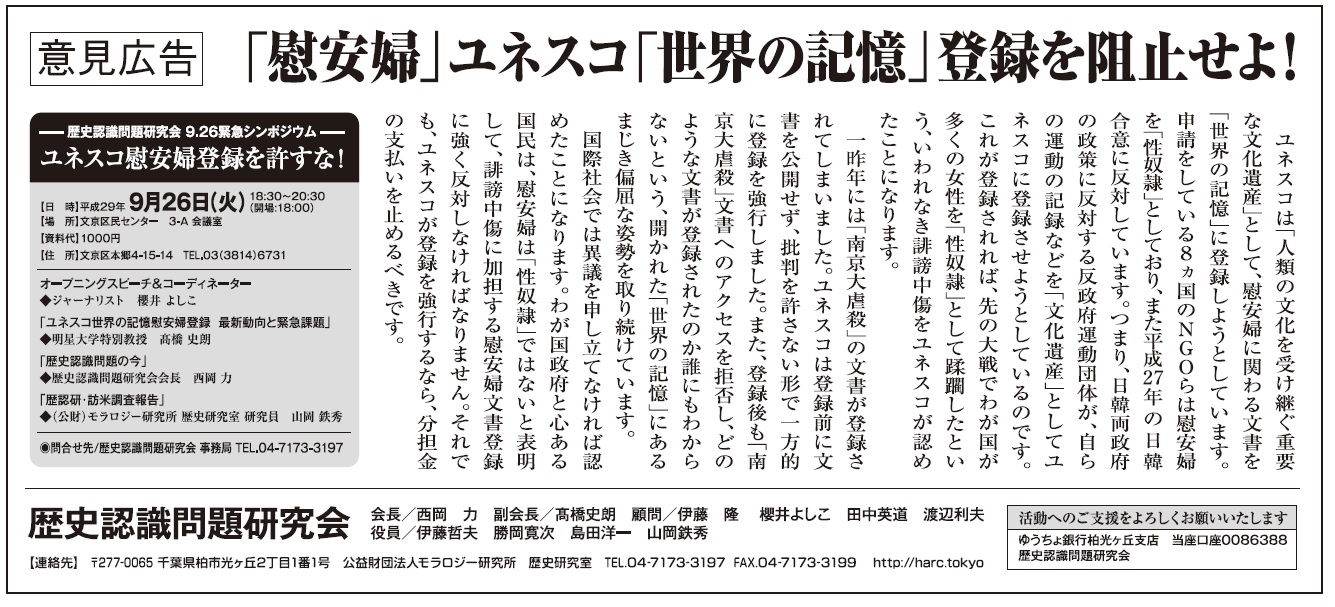***************************************************************************************
日本語訳/Japanese
[ PDF format download ]
Aug 23, 2017
United Nations Educational, Science and Cultural Organization
7, place de Fontenoy
75352 Paris 07 SP
FRANCE
Mr. Boyan Radoykov
Chief of Section
Universal Access and Preservation
OPEN LETTER
Re: Request for mediation with the Proposer of “The Voices of Comfort Women”
Dear Mr. Radoykov,
We, the four organizations represented by the four signatories below, made a proposal (No.2016-76) to the Memory of World Register, organized by UNESCO, and are aware that there are the two proposals on the “Comfort Women” currently being reviewed by UNESCO.
We understand that, according to information from concerned organizations or individuals, there is a possibility that some of our nominated documents overlap with documents included by another proposal, “the Voices of Comfort Women.” Should this be the case, our findings and those of the “the Voices of Comfort Women” appear to be contradictory with each other, even though the two proposals at least they are based on the shared documents.
In many occasions, UNESCO has asserted that it does not make historical judgments or interpretations of history. However, provided the same documents are nominated for the two proposals having contrary findings, UNESCO’s decision on either proposal for inclusion on the Memory of World register would have significant implications on historical judgments or its interpretations on a specific historical event, especially in the case that the one is registered to the Memory of World register while the other is rejected.
We do not wish at all that our proposal would generate negative impressions to the world on the Memory of the World Programme. Therefore, we would like to respectfully request UNESCO to mediate about the differences between the two proposers to clarify the categorization and interpretation of the documents overlapping, which we consider indispensable. The following possibilities should be carefully considered upon the mediation.
We would like to add that aforementioned request for meditation is completely in accordance with the views presented in the progress report of the IAC Chair concerning the review of the Memory of the World Programme, which was made available on the website of UNESCO.
Scenario 1
A possibility that documents irrelevant or inconsistent with the principal findings of the proposals are included
We completely understand that UNESCO has no intention to make historical judgments or its interpretations. On the other hand, UNESCO must carefully examine whether the Summary at the section 1 in the nomination form explain and describe the contents of nominated documents correctly and objectively, since the main objective of the nomination should be written in the Summary. Furthermore, UNESCO must strictly examine whether any documents which are irrelevant or inconsistent with their arguments are mixed in the documents nominated. If a decision is made to inscribe such documents, such decision can be regarded as a distortion or destruction of the value of precious primary source.
Scenario 2
A possibility that two or more proposers nominate same documents under incompatible categories
Provided that the same documents are nominated by two proposers for incompatible findings, UNESCO is required to handle the examination of such nomination proposals with utmost care and impartiality as well as rational, logical and transparent manners. However, this must not be easy at all. Besides, any decision can be regarded as an official judgment of the UN system upon a certain historical event. Especially in the case that one proposal is registered and another is rejected, UNESCO’s decision would lead to confusions and contestations among concerned member states and their people. Such outcome should be avoided by all means.
We request UNESCO to pay utmost attention in examining these two proposals in the above-mentioned two scenarios. It is necessary for UNESCO to clarify the intentions or reasons of the each proposer why the particular documents are selected especially those of the documents overlapping for the both proposals
We propose dialogues with the proposer of “the Voices of Comfort Women”, with a sincere hope that such dialogues would contribute to the examination being undertaken by UNESCO.
The dialogues are the most important tool in accordance with the spirits of UNESCO, and we consider that engaging in such sincere dialogues with the proposer of “the Voices of Comfort Women” is indispensable for fostering mutual understanding. This is to say that to make a decision of inscription or non-inscription on the register in absence of the dialogues that we are proposing in this letter goes against the spirits of UNESCO and would be inadmissible.
At the end of this letter, we would like to appeal again the goal of the Memory of the World Programme is neither to distort nor to destruct the precious primary sources but to safeguard and provide access to documentary heritage.
Respectfully Submitted,
References:
Extracts of the resolution adopted by the 201st Session of Executive Board, May 2017;
3. Welcomes the progress achieved by IAC on the MoW review
5. Welcomes the IAC Chairs progress report contained in the Annex (201 EX/5 Part I (H)) and encourages the IAC to continue working on the statutes and guidelines along the lines of this report and its recommendations.
6. Request the Director General to present the final report on the MoW review by the IAC to the Executive Board at its 202nd session.
* 201 EX/5 Part I (H)
(7) Questioned nominators will be given more time for dialogue to the concerned parties even before submission to the RSC. Dialogue may be mediated.
(c) If no agreement has been reached, continued dialogue among the concerned parties may be encouraged for one more cycle (i.e. maximum of four years).
(Signature)
Kase Hideaki
Chairman, the Alliance for Truth about Comfort Women
(Signature)
Koichi Mera,
Representative, the Study Group for Japan’s Rebirth
(Signature)
Kazunobu Oyama
Chief Director, the Institute of Research of Policy of Media and Broadcasting
(Signature)
Yumiko Yamamoto
President, Japanese Women for Justice and Peace
Appendix:
List of the documents possibly nominated by the aforementioned two proposers
***************************************************************************************
[ 日本語訳 PDF版ダウンロード ]
2017年(H29年)8月23日
国際連合教育科学文化機関(ユネスコ)
ユニバーサル・アクセス・アンド・プレザベーションセクション長
ボヤン・ラドイコフ 様
公開書簡
「慰安婦の声」登録申請団体との協議要請
ユネスコ「世界の記憶」に「慰安婦と日本軍規律に関する証拠文書」(No.2016-76)を申請した我々四団体は、現在ユネスコにおいて「慰安婦」に関する二つの申請が審査中であると承知している。
我々は、「慰安婦の声」を申請した団体の申請文書には我々の申請文書と同一文書が含まれている可能性があると理解している。仮にそうであれば、二つの団体が同一文書から導き出した主張は完全に対立したものとなる。
ユネスコは機会ある毎に歴史判断や歴史解釈は行わない方針を表明している。しかし、両者が相反する視点の下に同一文書を申請している可能性がある以上、「世界の記憶」として登録するかしないかの決定は、特定の歴史的事象の判断や解釈に重大な影響を与えることになる。特に一方が登録され一方が却下された場合にはなおさらである。
我々は、我々の申請が、「世界の記憶」事業に否定的影響をもたらすことを決して望んでいない。このような観点から、2者間で重複している文書の分類、解釈についての協議が必要と考えそのような機会の設置をユネスコに謹んで要請する。また、協議に際しては以下の2つの状況を考慮すべきであると考える。
この協議要請は、先般ユネスコがHP上で公表した「世界の記憶」事業の制度改善に関する国際諮問委員会議長による中間報告書に完全に合致したものであることを申し添える。
状況1
申請内容と関係ないか申請内容と一致しない文書が混入されている可能性
我々は、ユネスコには歴史判断や歴史解釈は行う意図はない点について完全に理解している。他方で、通常申請者は申請書の1 Summaryに申請の主要目的を記述している以上、ユネスコは少なくともサマリーの内容が客観的に申請文書を説明、描写しているかどうか慎重に審査しなければならない。更に申請の主張とは関係ないか一致しない文書が、主張を裏付ける文書として混入されていないかどうか厳しく審査すべきである。もしそのような文書が登録されれば、それは貴重な一次資料の歪曲と破壊を意味する。
状況2
複数の申請団体が同一文書をお互いに両立しない分類で登録申請している可能性
異なる筋書でお互い両立しない主張がなされているにもかかわらず、その裏付けとなる文書が同一である場合、ユネスコは非常に注意深く公正な取り扱いと合理的、論理的、そして透明性のある審査が求められる。しかしこれは容易ではない。しかも審査の結果が国連による歴史的判断になりかねない。特に、登録された申請と却下された申請がある場合、ユネスコの決定は加盟国とその国民の混乱と紛糾を惹起することになる。そのような事態は何としても避けるべきである。
我々は、上記2つの状況において二つの申請を特に慎重に審査するようユネスコに要請する。ユネスコは、特に重複する文書を選んだ申請者の意図を確認する必要がある。
我々は、ユネスコにおける審査の一助とするためにも、「慰安婦の声」の申請団体との協議をおこなうことを提案する。
我々は、対話こそがユネスコの精神に基づく最も重要な行為であると信じ、この協議を通じて「慰安婦の声」申請団体と真摯に議論することが、相互理解を深めるのに必要不可欠であると考える。つまり、我々がここに要請する協議をせずに登録可否を決めることは、ユネスコの精神に反することであり、あってはならないと考える。
最後に、世界の記憶の目的は貴重な一次資料の曲解や破壊ではなく、記録遺産の保護とアクセスの提供であることを改めて訴えさせていただく。
【参考】
2017年5月、 第201回執行委員会で採択された決議の関係個所(仮訳)
3.IACが制度改善について成し遂げた進捗を歓迎。
5.文書201EX/5 Part1(H)の添付に含まれるIAC議長の進捗報告書に留意し、IACが規定及び指針に係る作業を継続することを慫慂。
6.事務局長に対し、IACによる制度改善に係る最終報告書を第202回執行委員会にて報告することを要請。
※文書201EX/5 Part1(H)
(7)疑義を呈された登録申請者は関係者と協議を行う時間が、登録小委員会への提出前であっても与えられる。協議は調停されるであろう。
(c)仮に合意にいたらなかった場合、関係者間で次の審査サイクルに亘る期間(つまり最大4年間)協議が継続されるよう奨励されるであろう。
(署名)
加瀬 英明 慰安婦の真実国民運動 代表
(署名)
目良 浩一 日本再生研究会 代表
(署名)
小山 和伸 メディア報道研究政策センター 理事長
(署名)
山本 優美子 なでしこアクション 代表
【附属文書】
二つの申請団体がいずれも申請した可能性のある文書リスト

